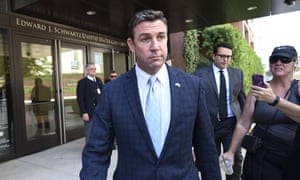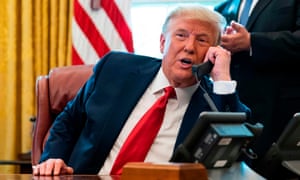Extract from The Guardian
President is said to be considering further interventions on behalf of aides, friends and family members
Donald Trump is expected to grant further waves of audacious pardons for allies and supporters – possibly even for himself – in a frenzied final month as US president.
Trump caused revulsion at home and abroad with dozens of pardons that included on Tuesday four former government contractors convicted in a 2007 massacre in Baghdad that left more than a dozen Iraqi civilians dead. On Wednesday the slew of pardons included close political allies such as Roger Stone and Trump’s former campaign manager Paul Manafort as well as Charles Kushner, the father of his own son-in-law and top adviser, Jared Kushner.
The pardons of Manafort and Stone rewarded two of the most notorious of Trump’s former advisers, both of whom were convicted of crimes after being indicted by the special counsel Robert Mueller, who investigated Russian meddling in the 2016 campaign.
Critics warned that the flood of pardons is still likely only the beginning. In the waning weeks of his presidency, Trump is said to be considering further interventions on behalf of aides, friends and family members he believes have been unfairly jailed, indicted or put in legal jeopardy.
The pardons on Tuesday also included two men convicted as a result of a special counsel investigation into Trump’s ties with Russia, three corrupt former Republican congressmen and, perhaps most controversially, four security guards employed by a private security company in Iraq.
Nicholas Slatten, Paul Slough, Evan Liberty and Dustin Heard were all serving lengthy prison sentences. Prosecutors alleged the men launched an unprovoked attack in a busy traffic circle using sniper fire, machine guns and grenade launchers in September 2007 in Baghdad’s Nisoor Square.
Critics in the US pointed out that the four men worked for Blackwater, which was founded by Erik Prince, one of Trump’s longtime supporters and allies. Prince is the brother of Betsy DeVos, the education secretary.
Hina Shamsi, the director of the American Civil Liberties Union’s national security project, said the shootings caused “devastation in Iraq, shame and horror in the United States, and a worldwide scandal. President Trump insults the memory of the Iraqi victims and further degrades his office with this action”.
There were also pardons for three Republican congressmen, including the first two to endorse Trump’s presidential campaign in 2016. Duncan Hunter pleaded guilty last year to misusing campaign funds and was sentenced to 11 months’ imprisonment. Chris Collins pleaded guilty last year to conspiring to commit securities fraud and making false statements to the FBI and is serving his 26-month sentence.
The president also granted clemency to George Papadopoulos, a former campaign aide who pleaded guilty in 2017 to lying to FBI agents about the timing and significance of his contacts with people who claimed to have ties to top Russian officials.

Trump has issued divisive pardons before, including for his former national security adviser Michael Flynn, who also admitted lying to the FBI, but Tuesday’s batch were seen as crossing a new moral line and drew sharp rebukes.
Noah Bookbinder, the executive director of Citizens for Responsibility and Ethics in Washington, said: “There have been many shameful, craven displays of Donald Trump using the presidency to benefit himself and his cronies, but there may not be any worse than these pardons.”
The Democratic National Committee said in a statement: “Christmas came early for convicted criminals with personal ties to Trump and who serve his political interests.”
The pardons came as Trump hurtles into his final four weeks in office, eager to test the loyalty of Republican allies. He upset the apple cart again on Tuesday by threatening to derail a $900bn coronavirus relief package that Congress had spent months negotiating, demanding payments of $2,000 to American citizens instead of the $600 agreed.
President Trump insults the memory of the Iraqi victims and further degrades his office with this action
Trump is also pushing Republicans to overturn the presidential election when Congress convenes to ratify the results of the electoral college on 6 January. Democrat Adam Schiff, the chair of the House intelligence committee, told CNN that Trump’s pardons convey a typically transactional message: “If you lie for me, if you’re loyal to me, I will abuse my power to protect you.”
Trump is not the first president to exploit what can seem an anachronistic power of the presidency. On his last day in office, Bill Clinton pardoned Marc Rich, a commodities trader accused of tax evasion and illegal trading, in what a New York Times editorial called “a shocking abuse of presidential power”.
But Trump has gone further: around nine in 10 of the pardons he has granted have been for individuals who can claim personal ties to him or to offer him political gain. Few observers doubt that there are more to come, possibly including pre-emptive ones for himself – the constitutionality of which would be hotly disputed – and his family.
Allan Lichtman, a history professor at American University in Washington, said: “Trump has already broken so many American traditions that I’m not sure what he does with pardons will stick or establish a precedent for future presidents. I don’t think Biden, for example, is going to follow any Trump precedent.”

No comments:
Post a Comment